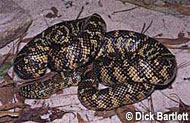Description:
The Florida kingsnake is now considered an intergrade between L. g. floridana and L. g. getula. The Florida king is a subspecies that is different than the rest of the kingsnakes due to the presence of 22 to 66 light (orange and yellow) crossbands on a dark brown background. Cages should be escape proof, complete with water and hiding area. Kingsnakes and milk snakes must be housed separately (except during breeding season) because they are cannibalistic. Inexpensive enclosures such as plastic shoe or sweater boxes work well if there are ventilation holes drilled in the sides. Aquariums or home-made enclosures also work well if you want to display the snake. A variety of substrates may be used (aspen shavings, corn-cob-type rodent bedding or newspaper) to keep the animals clean, warm and dry. Kingsnakes will feed on just about anything. They will consume warm-blooded prey such as rodents and birds, as well as cold-blooded prey such as lizards and frogs (in addition to other snakes). Many species adapt well in captivity if kept between 80 and 85 degrees Fahrenheit, with a nighttime drop of five to 10 degrees. Temperature control is important as it maintains feeding response and digestion.
Habitat:
Swamps, everglades and subtropical areas. Often found near sugarcane fields.
Range:
Throughout central and northern Florida.
Scientific Name: Lampropeltis g. floridana and L. g. getula
Species Group: kingsnake
Family: Colubridae
Size: It reaches 5 or more feet in length and is fairly heavy-bodied.
Level: beginner
Weight:
Dangerous: No


